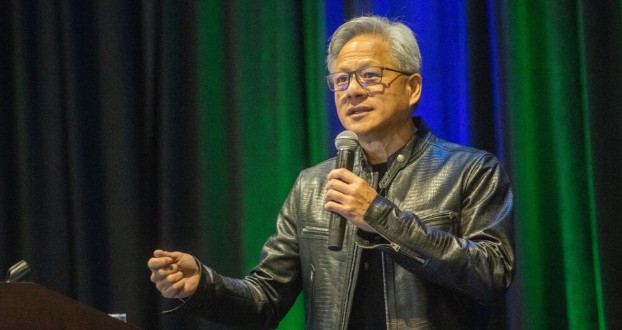젠슨 황 엔비디아 CEO가 현지 시간 7일 캘리포니아 산타클라라에서 열린 정밀의학 국제 콘퍼런스(PMWC)에서 루미너리상을 수상했다고 밝혔다.

▲젠슨 황 CEO / (사진:엔비디아)
가속 컴퓨팅과 AI 통한 정밀의학 발전 공로
수술 로봇·디지털 트윈·AI 비서 등 의료 혁신
젠슨 황 엔비디아 CEO가 현지 시간 7일 캘리포니아 산타클라라에서 열린 정밀의학 국제 콘퍼런스(PMWC)에서 루미너리상을 수상했다고 13일 밝혔다.
엔비디아는 의료 이미징, 유전체학, 계산 화학, AI 기반 로보틱스 가속화에 기여한 점을 높이 평가받았다. PMWC는 의료 분야 리더, 연구자, 생명공학 분야 혁신가들이 모이는 국제 콘퍼런스로, 루미너리상은 정밀의학 발전에 기여한 혁신가에게 수여된다.
엔비디아는 20여 년간 과학자들이 생명과학, 의료 이미징, 유전체학을 더 잘 이해할 수 있는 기기를 구축하며 의료 분야 발전에 힘써왔다.
젠슨 황 CEO는 “우리는 프로그래밍 가능한 과학 기기를 만들었으며, 우주의 생명을 더 잘 이해하고자 노력하는 연구자와 과학자들을 위해 이 기기를 만들었다”고 수상 소감을 밝혔다.
2000년대부터 생명과학 분야에 가속 컴퓨팅이 활용됐으며, 2006년 엔비디아 CUDA 플랫폼 도입으로 의료 이미징 분야에 GPU 활용 가능성을 제시했다.
매사추세츠 종합병원 가드 게츠 박사는 “엔비디아는 AI와 머신러닝의 핵심인 GPU를 개발하며 정밀의학을 포함한 세상 변화에 기여하고 있다”면서, “엔비디아 AI와 가속 컴퓨팅은 염기서열 데이터 분석, 해석, 신약 개발 등에 영향을 미치며, 교육용 LLM에도 기여하고 있다”고 덧붙였다.
젠슨 황 CEO는 AI가 의학 발전에 기여할 수 있는 다양한 방안을 제시했다. 그는 AI 투자로 강력한 플라이휠을 구축, AI와 상호작용하는 전문가들의 데이터와 피드백을 통해 정확성, 효율성, 인사이트를 지속적으로 개선할 수 있다고 설명했다.
그는 “AI는 의료 산업을 혁신해 질병 예측, 진단, 치료에 획기적인 도움을 줄 것이며, 디지털 트윈을 통해 종양 진화 모델링 및 맞춤형 치료법 예측도 가능하게 할 것이다”라면서, “2030년 이전에 모든 세포를 이해하는 것도 가능하며, 세포 모델링, 세포 언어 이해, 미래 예측도 가능해질 것”이라고 전망했다.
그는 수술 로봇, 로봇 간병인, 로봇 실험실 등을 통해 의료 분야 발전을 가속화할 수 있다고 예측했는데, 의사들이 환자에게 집중할 수 있도록 AI 비서가 도움을 줄 수 있을 것이라고 덧붙였다.
